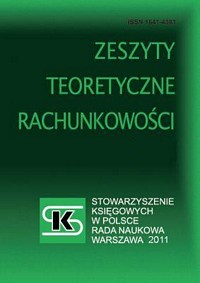Business combinations under common control in International Financial Reporting Standards – is authoritative accounting guidance needed?
Business combinations under common control in International Financial Reporting Standards – is authoritative accounting guidance needed?
Author(s): Magdalena JanowiczSubject(s): Financial Markets
Published by: Stowarzyszenie Księgowych w Polsce
Keywords: business combinations under common control; methods of accounting for business combinations; disclosure in financial statements; IFRS/IAS; national GAAPs
Summary/Abstract: The purpose of the article is to answer the question if a separate standard (IFRS) is needed for business combinations under common control (BCUCC), which are not governed by any IFRS as the moment. In such cases, the approach resulting from IAS 8 should apply to them, which allows the use of national regulations to account for BCUCC. The authoress shortly described the theoretical issues related to the subject and presented the results of empirical research that verified the practical aspects of the problem. The research methodology involves a literature and legal act analysis, content analysis of financial statements, as well as deductive and inductive reasoning. On the basis of the gathered data the authoress concluded that even the existence of necessary regulations in national GAAPs does not guarantee that all the requirements related to the qualitative characteristics of the reported information are met and, as such, the main objectives for which IFRS were developed may not be met. As such, the authoritative guidance proves necessary. Very little research on the subject was published, thus, this paper may provide some additional guidance as to what issues related to BCUCC should receive particular attention.
Journal: Zeszyty Teoretyczne Rachunkowości
- Issue Year: 2017
- Issue No: 93
- Page Range: 97-112
- Page Count: 16
- Language: English

